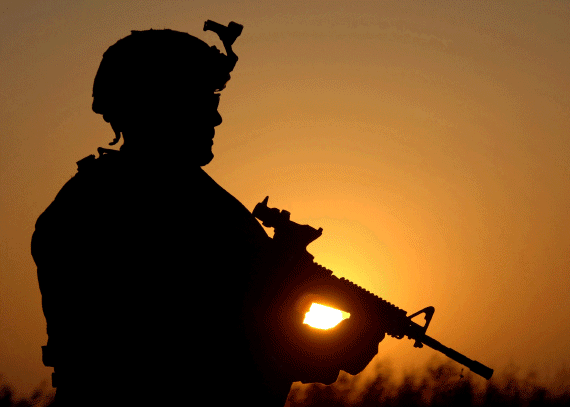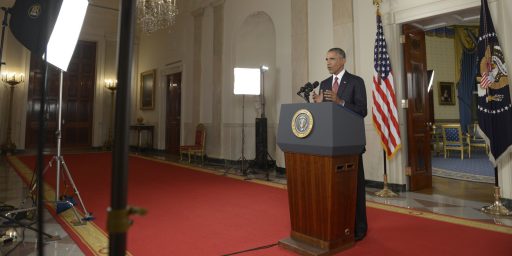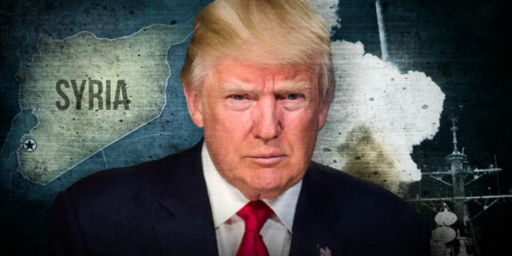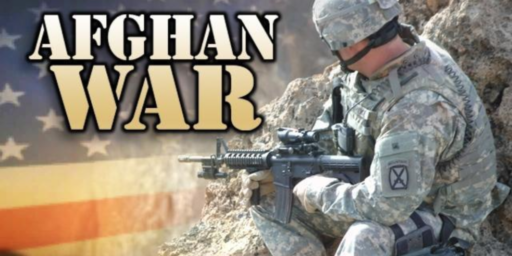America’s Forgotten, And Forever, Wars
America has become involved in conflicts around the world, largely without the knowledge of the American people or the consent of their representatives, and it doesn't appear that's going to end anytime soon.
The Editors at The New York Times catalog the extent to which America’s military commitments around the globe have metastasized in the sixteen years since the September 11th attacks:
The United States has been at war continuously since the attacks of 9/11 and now has just over 240,000 active-duty and reserve troops in at least 172 countries and territories. While the number of men and women deployed overseas has shrunk considerably over the past 60 years, the military’s reach has not. American forces are actively engaged not only in the conflicts in Afghanistan, Iraq, Syria and Yemen that have dominated the news, but also in Niger and Somalia, both recently the scene of deadly attacks, as well as Jordan, Thailand and elsewhere.
An additional 37,813 troops serve on presumably secret assignment in places listed simply as “unknown.” The Pentagon provided no further explanation.
There are traditional deployments in Japan (39,980 troops) and South Korea (23,591) to defend against North Korea and China, if needed, along with 36,034 troops in Germany, 8,286 in Britain and 1,364 in Turkey — all NATO allies. There are 6,524 troops in Bahrain and 3,055 in Qatar, where the United States has naval bases.
America’s operations in conflict zones like Africa are expanding: 400 American Special Forces personnel in Somalia train local troops fighting the Shabab Islamist group, providing intelligence and sometimes going into battle with them. One member of the Navy SEALs was killed there in a mission in May. On Oct. 14, a massive attack widely attributed to the Shabab on a Mogadishu street killed more than 270 people, which would show the group’s increased reach. About 800 troops are based in Niger, where four Green Berets died on Oct. 4.
The Times editors go on to note that the American people have accepted these missions and assignments in parts of the world that most of us have only limited awareness of at best and our involvement in conflicts that most of us are unaware of. I’m not sure that this is true, however. In reality, it seems to more be the case that most of these involvements are not unfolding in front of us on television the way the Iraq War did between 2003 and 2011, or the Persian Gulf War and Vietnam Wars before it. This has been especially true of the war in Afghanistan, which has received only limited press attention virtually from the time it started in October 2001 largely because of the fact that it is much more difficult for American news media to get reporters into the country, and more importantly into the areas where the fighting was taking place. Because this war wasn’t unfolding live on our television screens every day and the fact that casualty rates in Afghanistan have always been far below those we experienced in Iraq,
The same is even more true of the shadow wars taking place across the globe now that American forces have been committed, usually without the knowledge of the American people and, apparently, without the knowledge of members of Congress and the Senate. Quite often, as in the case of the apparent deployment in Niger that most Americans were unaware of prior to the October 4th incident that resulted in the death of four Green Berets, these deployments only become public when something goes wrong. Otherwise, they remain secret and the American people remain in the dark about what is being done in their name not only in nations like Afghanistan, Iraq, and Syria, but also in nations in Africa and elsewhere that most of us have never even heard of fighting a supposed enemy that neither the Defense Department nor the White House has even tried to identify. It’s because of this that Americans have developed what Andrew Bacevich, a retired Army Colonel who has become a critic of current American foreign policy calls ”a collective indifference to war [that] has become an emblem of contemporary America.” It’s not surprising that the American people are indifferent when the media isn’t covering the conflict and the government isn’t telling us about them.
The editorial goes on to argue that, due to the expanded nature of the so-called War On Terror, it is long past time for the part of the government that is supposed to represent the American people most closely, stepped up to the plate:
it’s time to take stock of how broadly American forces are already committed to far-flung regions and to begin thinking hard about how much of that investment is necessary, how long it should continue and whether there is a strategy beyond just killing terrorists. Which Congress, lamentably, has not done. If the public is quiet, that is partly because so few families bear so much of this military burden, and partly because America is not involved in anything comparable to the Vietnam War, when huge American casualties produced sustained public protest. It is also because Congress has spent little time considering such issues in a comprehensive way or debating why all these deployments are needed.
Congress has repeatedly ducked efforts by Senator Tim Kaine, Democrat of Virginia, and others to put the war against the Islamic State, which has broad popular support but no specific congressional authorization, on a firm legal footing. President Trump, like his predecessor, insists that legislation passed in 2001 to authorize the war against Al Qaeda is sufficient. It isn’t. After the Niger tragedy, the chairman of the Senate Foreign Relations Committee, Bob Corker of Tennessee, has agreed to at least hold a hearing on the authorization issue. It is scheduled for Oct. 30.
Congressional inaction in this area is hardly a new development, of course. Since the end of World War II the United States has engaged in numerous military conflicts across the globe without a formal declaration of war as required by the Constitution, and in many cases has done so without the knowledge of most of the members of Congress except perhaps for those who serve as the Chairman and Ranking Member of a handful of Congressional Committees. The Korean War, for example, was fought pursuant to United Nations resolutions rather than any kind of real Congressional debate or authorization beforehand. The same was true of the numerous engagements in Central and South America that the U.S engaged in during the Cold War, the Vietnam War, and the Persian Gulf War.We saw it again in 2011 when the Obama Administration committed American forces to intervene in the ongoing civil war in Libya without any Congressional debate whatsoever. Instead, the Administration claimed to have all the authorization it needed from a series of United Nations resolutions and Congress did nothing in response.
Even in those situations where there was a Congressional debate and vote on something that was arguably similar to a declaration of war, such as the Authorizations for Use of Military Force that were debated and passed by Congress in advance of the wars in Afghanistan and Iraq, the authorization was so open-ended as to be essentially meaningless. For example, notwithstanding a legal argument that is at best dubious and at worst disingenuous, the government has taken the position that the ongoing operations against ISIS are authorized by the AUMF that was passed authorizing operations against al Qaeda and whoever else was responsible for the September 11th attacks. As I’ve argued before, see here and here for example, the connections between ISIS and al Qaeda are tenuous at best, and the fact that Congress has sat back and done nothing with regarding to the war against ISIS with the exception of routinely authorizing new defense spending going to a conflict that has never been specifically approved by Congress.
Now, as we find out that there are American forces engaged across the globe in conflicts that haven’t been fully explained to the American people, we find once again that Congress has been left out of the loop. The fact that these commitments are relatively secret and limited means that they are flying under the radar, and it’s only because of the tragic deaths of Sgt. La David Johnson and his fellow soldiers, and the controversy that has arisen in the wake of their deaths, that the American public even knows that this mission is taking place. There’s been little explanation of what the goals of these missions are, how many troops are committed and where they are committed, and what the measures of success or failure might be with regard to these missions. In the process, we are likely creating new enemies that we will be forced to deal with at some future date. The fact that the American people and their representatives are largely unaware of all of this is not only tragic, it’s downright criminal. It’s time for the Administration to start answering questions, and for Congress to start doing the job the Constitution gave it to do.







Just as a point of fact, our involvement in Niger was never “secret.”
Further, our support to Niger is actually more analogous to our support to Columbia over the last quarter century than it is to Iraq or Afghanistan. I doubt many Americans realize we’ve been deploying Green Berets to Columbia since the late 1980’s (even though it’s well documented), nor are they likely aware of the ongoing US military support to various other countries as part of the so-called War on Drugs or as buttresses to governments against insurgency.
Anyway, I do agree completely that Congress as abrogated its responsibilities, particularly with the AUMF and its complete failure to check the Executive’s decision to engage in elective war, as was the case in Libya, which is probably the most egregious example. However, not every deployment of US military forces should require a specific Congressional authorization. Further, the use of Special Forces (and other special operations units) for its traditional support roles, like foreign internal defense, is not war and I think it’s a mistake to lump everything under that rubric. Congress would still have oversight there and, of course, it controls the money.
I don’t have a problem with using US forces to hit AQ and ISIS wherever they pop up. But there has to be some legal basis for it, Congress has to be in the loop, and we have to make sure we have adequate forces to carry out the mission.
I think the ‘forever war’ trope is out-of-date and like so much of what we talk about in foreign policy is an echo of long-ago wars which conformed neatly to a three-act structure. Fighting terrorism is essentially a crime-fighting operation, nothing at all like the Civil War or WW2. We’ve been in a ‘forever war’ against rape and murder since, well, forever. It’s going to be the same with terrorism. We can keep denying we are the world’s policeman, but we are just the same.
That said we need Congress actively providing oversight – just as they and more local governments should be actively overseeing police activities.
Perhaps this is the value of having a real military draft…if more Americans had some skin in the game they would know more about all of these overseas deployments and would demand more of their government in having proper oversight of these conflicts…
The Niger might or should be familiar to many Americans
because of the Joe Wilson-Valerie Plame “outing scandal” that occurred back in 2003.
from ThinkProgress.org:
58,220 corpses including 17,671 draftees over 19 years.
How much “skin in the game” does it take for citizens to demand proper oversight of these conflicts?
For me the question is whether there is some grand strategy behind all this. I see an expenditure of treasure and blood without a clear national interest at stake. We got into a war to get rid of Saddam Hussein for unclear reasons which resulted in a Shiite pro-Iran regime in Baghdad. Our war in Syria put us on a strange mission to find the good guys over there and resulted in millions of refugees now flooding Europe. We are equipping the Iraqis and Kurds fighting ISIS in Raqqa while both these sides are fighting each other in the next town over. What is the plan behind all this? The price of petroleum is half of a few years ago; doesn’t that greatly reduce our need for Middle Eastern and African oil?
Don’t get me wrong, I am not in favor of a draft, and your question is a very good one…sadly, apparently not enough lives have yet been lost to make citizens demand proper oversight of these conflicts…
@Slugger: There was supposed to be a plan? I thought it was about randomly destabilizing the region so that Democracy [TM] would look more desirable than despotism. You don’t need a plan for that, do you?
@Mister Bluster:
No. Fvck the fake bone-spur exemptions that allow the rich not to bear the burden of war.
The draft is a horrible thing, as is war.
It is even worse when the burden is placed on the economically challenged.
As with all politicians, actually as with everyone, congress loves authority, congress loves power. What politicians hate is responsibility. If they aren’t forced to take responsibility for wars, they won’t. As long as presidents get cred for being “strong” by starting wars, they will.
There is a strategy… 9/11 created a school of thought on the beltway that ungoverned spaces around of the world would be denied to terrorists organizations as safe havens for planning and training operatives for external operations. Niger is one of those spaces. In many of these countries, those that have an interest in rule of law and strong central government have 3rd-rate fighting men and equipment. Terror organizations can pay more…so they have the better quality fighting men and many times also have foreign fighter expertise directly from the battlefield in Iraq and Syria.
The US mission is to basically to take a farmer army and make a semi professional military fighting force out of it…while developing relationships with village elders to extract intel for what external attacks on the US and Europe may be in the hopper. Secondary mission is to prevent the hodgepodge of terrorist groups from coalescing into a single network that institutes ISIS 2.0 on the African continent.
Well, the Bush Administration warned us when they started referring to the “Global War on Terror.” Last time I looked, “global” meant “anywhere in the world.” They didn’t put any conditions on it.
I think given the ignoramous in the White House it behooves Congress to neuter him as much as possible. When you simply abdicate Foreign Policy to the Generals, as he has done, then you are asking for more of the above.
@Jim Brown 32: I don’t know enough about the situation in Niger to make an informed comment. I will say that the break-up of Yugoslavia, the results in Iraq, the ongoing fighting in Syria make me leery about arming anyone out there. Once we convert the local farmers into a semi professional army will they decide to use this power to advance the security of the USA or will they use it to seize a local advantage over their territorial rivals? As I said, in Raqqa Kurds and Iraqi forces are fighting ISIS while in Kirkuk they are fighting each other. Their local interests outweigh their desire to protect America. Our Sec. of State called on the Kurds to abandon their independence vote. In Syria we backed a Sunni coalition that surely was not 100% devoid of AQ thinking.